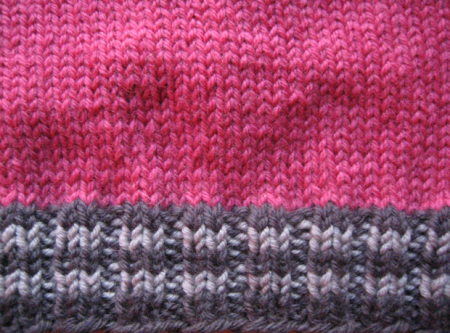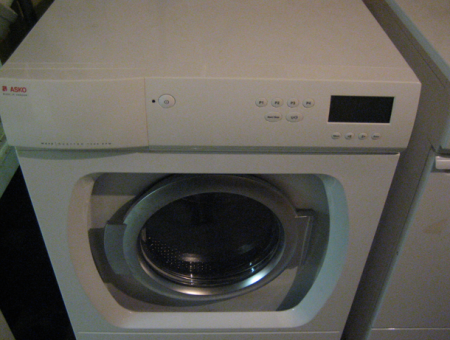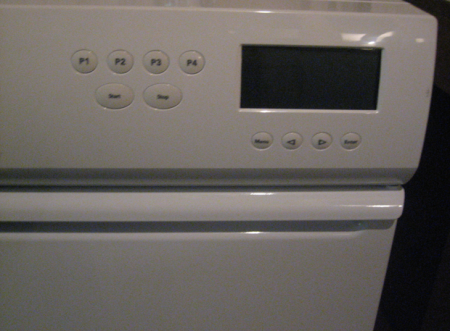Asko not
I strongly believe that we do have to do something radical about our energy consumption in this country. Strongly. Believe.

I also strongly believe that I should have more done on this elephant sweater than I do, but…
I would however be the first to admit that this is easier said than done. After all, we’re not just talking about changing people’s habits, which would be hard enough, we are also talking about an entrenched infrastructure and set of broader social habits that rests on the assumption that more or less every American has access to a car.
So it isn’t just that we’ve got these gas guzzlers on the road, it’s that there is massive technological momentum (as we call it in the science studies biz) behind the automobile. And technological momentum is extremely hard to reverse.
As an individual, you cannot reverse it. You cannot. There is literally no way to live in most parts of this country without a car. It can’t be done. So at the moment driving a car everywhere doesn’t mean that you’re part of the problem, it means that you’re part of an inescapable system.
Now I’m singling out the automobile here not because there aren’t other environmental issues, but I think from the standpoint of the individual the car is, well, the thing. What I mean is, the car drives (no pun intended…heh…heh) a great deal of the rest of our overconsumption. And that drives a lot of industrial pollution and energy consumption and so forth.
Alex and I happen to live in one of the handful of places in the country where one can be “car-free,” and we happen to be in a phase of our lives where there ain’t a lot of loose cash floating around, if you know what I’m saying, so we don’t own a car.

Although I did make this lovely ribbing. I love the way the colors look together. And also the odd way that the ripples in the fabric look a little like…Voldemort’s face. Or maybe that’s just me.
When you don’t own a car, you think very carefully about what you buy. Because you and you alone are going to get to haul it back to Chez Mad Dog on the city bus. I hasten to add that this condition does not make us morally superior to anyone else.
It just means we’re strapped.
But it has led me to reflect upon the fact that there’s just a lot of stuff you can’t buy if you don’t have a car. A lot of stores you cannot frequent—including nearly all those horrific superstores like Home Depot, Costco, IKEA, etc. A lot of large stuff you cannot haul home and hoard. Interestingly, when people learn that we do not own a car, they frequently express shock and say something like, “Oh my God, how do you do it?”
Rather like they have just learned that both of us have recently lost an arm and a leg in a tragic accident and are now stumbling about on crude, newly-acquired prostheses.
It really is not anywhere near that bad. But it is a comment on the perception that having your own ride is just downright compulsory. Even in the rare instances where it is not.
Which leads me back to the problem of said automobile. Among other things, we’re going to have to deal with the car and everything that radiates outwards and backwards and forwards from the car, and that’s going to be a tough, tough thing to do. Not impossible, but very difficult. It will have to be a systematic fix too, not a matter of a few individuals here and there deciding and being able to ride bikes or take the bus.
I’m all for the bikes and the bus, by the way, but I’m speaking here of a society-wide solution that works, one that modifies the central technology we’ve got, works with the existing infrastructure, and acknowledges people’s real needs. I myself do not have a feasible plan right now, of course, but I’m working on that… I am taking suggestions. Feel free to share your ideas.
Meanwhile, we’ll all continue our nickel-and-dime environmentalism—recycling bottles, cans, jars, mixed paper; buying green cleaning products; driving a Prius. It’s not going to be the thing that solves the problem, but at least we can feel that we’re doing something.

Want to talk about overconsumption? Look what I just bought. Cherry Tree Hill Gems Merino. And this when I was actually on a successful yarn diet…
Alex and I have recently added to our nickel-and-dime environmentalism portfolio a new washer and dryer made by Asko, a Swedish company that stresses the environmentally-friendly, energy-efficient, water-saving aspects of its machines. Our landlady brought us these over the weekend, bless her heart.
Asko. As in, “Asko not what your washer can do for you, Asko what you can do for your washer!”
Because—and I don’t mean for a minute to sound ungrateful here—the Asko washer and dryer is not like your old Whirlpool. Here’s the front of the washer:

And a close-up of the “dashboard” of the dryer:

Simple in its way, yes, but would you know how to run a load of laundry without reading the manual? Yeah. That’s what I’m saying.
So a couple of nights ago, I decide to run my first load of environmentally-friendly laundry. I read the manual for the washer. I screw up the programming a couple of times. I curse and stomp. I finally program it to run a “normal” load of dark clothes. All is well, I think.
Then I read the digital timer at the right of the display. It reads, “One hour and fifty-five minutes.”
Yep, you got that right: two hours to run a “normal” load of clothes. Green is apparently a synonym for “excruciatingly slow.”
Okay, I think, next time I’ll try the “quick” cycle. It will probably only be an hour and a half.
I dutifully come back two hours later. I read the manual for the non-intuitive dryer. I screw up the programming a couple of times. I curse loudly and impugn the name of the Swedes and their mothers and grandmothers. I cry out in anguish, “Whirlpool, why hast thou forsaken me?” Then I finally manage to program it for a “normal” drying cycle.
This time I’m less surprised when the digital timer reads one hour and twenty minutes.
I am however weeping with frustration and otherwise going to pieces quietly in the corner of the basement.
When I informed Alex that a “green” load of laundry takes three hours and twenty minutes to complete, he said, “I see it all now. The Asko machines are more energy efficient because you quickly figure out that it is faster to do all your laundry with a washboard and a mangle.”
And so it appears that in appliances as in other arenas we have a long way to go to make our ideals match up with our practical needs.
Until then, I’d hang onto your old Whirlpool.
July 26th, 2007 at 4:54 pm
Oh, heavens! I am very happy with my front-load washer and dryer from Sears. Kenmore, baby.
I live in one town, and I am very fortunate to be employed, but in another town with no bus service. Someday I’m going to take a bike to a bus to a bus to a bike just to show it can be done. But Lordy, 2-3 hours each way versus 1/2 hour in a car? I’ll plant some trees or something.
July 26th, 2007 at 6:20 pm
Kim, that is so completely it about the car vs. the bus and the bike, isn’t it? It just isn’t feasible to do the “green” commute most places in the U.S.
I look forward to the day that that will change. Until then, plant your trees. Definitely.
And yeah, Kenmore. I can only dream!
July 27th, 2007 at 1:55 am
I can commiserate with your washer anguish. I am currently living in Malmo, Sweden. My first laundry experience ended in heartbreak and tears (and my husband having to come home early from work.) I am jealous that 1- you have an instruction manual for your washer and 2- that instruction manual is in english. Oh yeah, and the dryers over here take even longer to run than the washers. It’s faster to hang them on the line to dry (Your son is right – it’s faster to just do everything by hand.)
All whining aside, Malmo is a great little town. Most everybody over here has a bicycle, only maybe half (if that many) have a car. There are definitely more bikes than cars. And the buses are very reliable. (And nobody bats an eye when you get on the bus with a giant box/bag from Ikea.)
July 27th, 2007 at 11:14 am
You know what really gripes me? The packaging that everything comes in. Apparently to discourage or slow down the shoplifter, everything we buy comes packaged in much too much plastic and paper and wires and stuff that all gets thrown away. Last time I bought my grandson a toy it took me half an hour to pry off all the plastic and wire that held the thing into its packaging. And I feel for the you folks who have to carry everything home from the store, because it adds needless weight and bulk. Why can’t we, as consumers, stop this wastefullness?
And re the washer/dryer, I think your HUSBAND Alex might be on to something! What better way to spend Saturday morning and afternoon than scrubbing up the week’s laundry? Shoot, it could even double as your meditation and reflection time!
July 27th, 2007 at 4:15 pm
Whatever my washer/dryer are (whirlpool/frigidaire), the cycle times are pretty speedy (and it’s a front load). I haven’t timed it at all, but I’m so often doing other stuff, that I just don’t notice. The dishwasher, however, leaves much to be desired. Ladies, never, ever, let your husband pick out a dishwasher. He meant well, and Consumer Reports says it’s wonderful, but it has some serious design flaws as far as I’m concerned.
July 27th, 2007 at 7:11 pm
Your great-uncle Alex was probably kidding, but when I had a “green” washer/dryer in France I did in fact find myself doing a significant portion of my laundry by hand. (If you’re waiting three hours for the lights to finish, you might as well do something about the darks…) Of course, this approach sometimes necessitates emergency use of a hair-dryer (clean underwear is a good start, but really you’d also like it to be dry), so it’s questionable just how much energy I really saved…
July 27th, 2007 at 8:32 pm
Oh, Kate. You and Jenn are not making me feel any better about this…
July 28th, 2007 at 2:57 pm
Hahaha, sorry, didn’t mean to cause consternation! I shouldn’t have been so critical of my Frenchie washing machine. There is an upside, actually, especially to airdrying things, because once you discover that you can actually function without the convenience of dry clothes on command, you can save your wardrobe the unnecessary beating it takes in the dryer. This is very green, of course, saving electricity and reducing consumption by needing to replace things less often – but more self-interestedly, it also staves off the huge bummer of one’s favorite shirt starting to look prematurely worn.
July 28th, 2007 at 9:26 pm
And the greenest idea of all. Just don’t wash your clothes. Use perfume and lots of it.
I truly believe in the theory of green-ness, but the practice of it is sometimes so overwhelming.
Congrats to your and your handsome husband on all the nuptials and festivities. I thought of you as my cousin got married on the rocky coast of Maine and on my quick day-trip to Boston. Next time I’ll have to plan to stay in Beantown longer so I can actually see you and swap knitting stories!
July 30th, 2007 at 2:14 pm
I have heard about these environmental appliances. They say they are environmentally conscious, but it uses about the same amount of resources if not more to do the job of a “regular” machine. Some analysts also said they break down quicker than the “regular” machines, which is not feasible for someone with limited income.
As for your car, I am so happy that you don’t own a car. I live in Southern CA and it is impossible to not have one. I wish I don’t need one, but it can’t be done here. I tried taking the bus to visit my aunt when I was younger who lives 1/2 hour from our house by car. But it took us 3+ hours on the bus to get to her house.
July 31st, 2007 at 2:26 am
I have a front load washer which is a bit slower than my old top load, but not THAT slow. The “whitest whites” cycle takes about 90 minutes, but a regular cycle takes just about an hour. The whites cycle takes longer becuase it does a second rinse. It still uses MUCH less energy and water however. One “fillup” of a front load takes about 5 gallons of water, in contrast to the 25-30 gallons used per fill up in a top loader. The reason it’s so slow is that it cleans the clothes by flopping them around over and over and over instead of beating them with an agitator.
I’m confused about how the dryer could be that slow. One of the other benefits of a front loader is that it spins the clothes at about 8 bazillion RPMs, thus expelling almost all the water and shortening the dryer time considerably. Does your dryer actually heat up? Perhaps you need a slightly more aggressive cycle on the dryer?
As for the transportation issue – I have tried valiantly to use the bus system, but it’s hard to justify an extra 2 hours out of the day when I already feel time crunched. And, as you know, cycling on the road has not been working out so well for me. Also, even if I weren’t afraid of cars, it’s hard to bike commute in a hilly area unless there are shower facilities and time to change at the destination. So . . . my solution is that I’m going to buy a motor scooter as a car alternative. I’ll still have my car and will use it when I need either the cargo space or the protection of the car body (for highway trips) but I’m going to use the scooter as much as I can.
July 31st, 2007 at 2:27 am
Oh! I forgot to ask – have you read the 7th Harry Potter?